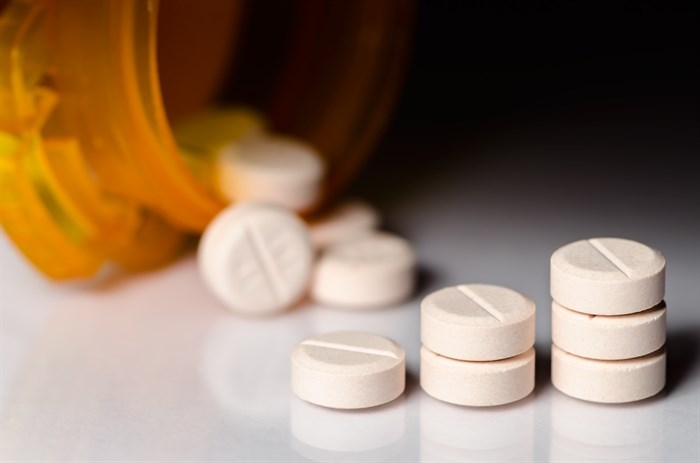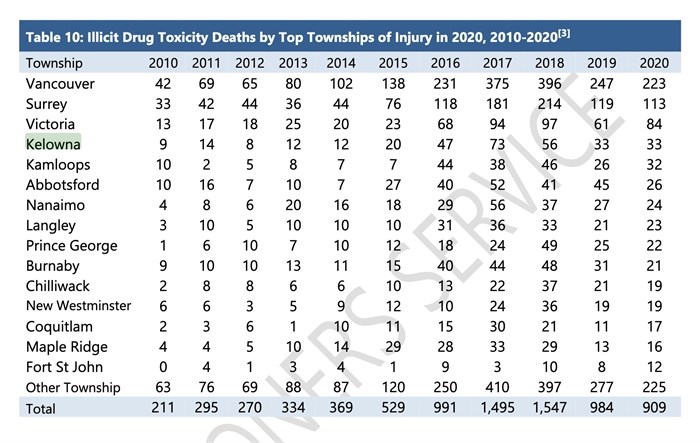
Image Credit: ADOBE STOCK
August 25, 2020 - 6:30 PM
Drug overdose deaths in Kelowna, Kamloops and a number of other B.C. cities have already surpassed 2019 deaths by the halfway mark of 2020 and they're on track to surpass the worst year of the health crisis.
The Ministry of Health released illicit drug toxicity deaths statistics today and painted a grim picture.
In Kelowna, from January to July, there have been 33 drug-related deaths. That's the same number of deaths for the entirety of 2019. In 2018 there were 56 deaths and in 2017, the height of the overdose crisis, there were 73 deaths.
It's a similar situation in Kamloops, where there have been 32 deaths from January until July.
In 2019, there were 26 for the year and in 2018 there were 46. At the height of the overdose crisis, in 2017, Kamloops had 38 overdose deaths.
Across the province there have been 909 overdose deaths until July.

Overdose deaths.
Image Credit: SUBMITTED/Ministry of Health
In a press conference today, Aug. 25, chief coroner Lisa Lapointe said there were 175 illicit drug deaths across the province this July, representing a 136 per cent increase over the number of deaths seen in July 2019.
The July figures raise the yearly total of drug deaths to 909.
Lapointe said, historically, these issues have been dealt with through punitive measures and that's clearly not working. A new way forward may be showing itself.
"We have been, as governments and societies, supportive of building jails, or punishing people and building places... where punitive measures were what was deemed appropriate for those experiencing problematic substance use, or possession of unlawful substances," she said. "And, of course, we've funded police to do that as well."
Recently, LaPointe said, the Canadian Association of Chiefs of Police came out and said it is a medical issue and they don't want to arrest people for possession of substances.
"We saw the federal Crown come out, I believe, just last week and say, we no longer want to see people charged for possession of substances unless there are specific criteria that make it particularly egregious," she said.
So, she argued, some of the costs allocated to the punitive approach to this matter may now be available to adopt a medically empathetic model.
As is, the cost of the overdose crisis is significant and goes beyond dollars and cents, B.C.'s top doctor said.
"The things we need to consider are not just cost to the healthcare system but costs to society," Dr. Bonnie Henry said. "We look at things like potential years of life lost... we're talking about mostly young people, people in their 30s and 40s, and some younger ... but also the potential loss to our communities, our families, our society."
It's immense, she said.
One of the main pursuits of health officials dealing with the overdose crisis is creating a safer supply chain because B.C. has a toxic drug situation. It's unclear when it will happen but Dr. Henry joked it should have been three months ago.
"There's several different models that we're looking at. One could be a clinic where people could go in, where there's a nurse practitioner or a nurse, who's able to follow what we call the decision support tool, and for the medications that people need," she said. "There's also ways that we are looking at with our physician colleagues, with pharmacists and with our nursing leadership around some of the newer virtual care approaches that have come through in the last few months. There has been a dramatic shift in how care is provided in the communities right now because of the pandemic and we need to be able to take advantage of some of that to look at different models of supporting people who use drugs to get access to what they need to support them as well."
As for when that will happen, Dr. Henry said these protocols are being worked on even as we speak.
To contact a reporter for this story, email Kathy Michaels or call 250-718-0428 or email the editor. You can also submit photos, videos or news tips to the newsroom and be entered to win a monthly prize draw.
We welcome your comments and opinions on our stories but play nice. We won't censor or delete comments unless they contain off-topic statements or links, unnecessary vulgarity, false facts, spam or obviously fake profiles. If you have any concerns about what you see in comments, email the editor in the link above.
News from © iNFOnews, 2020